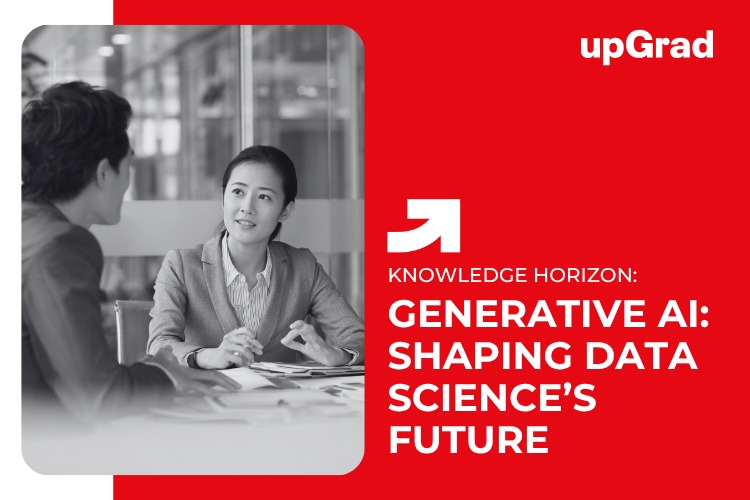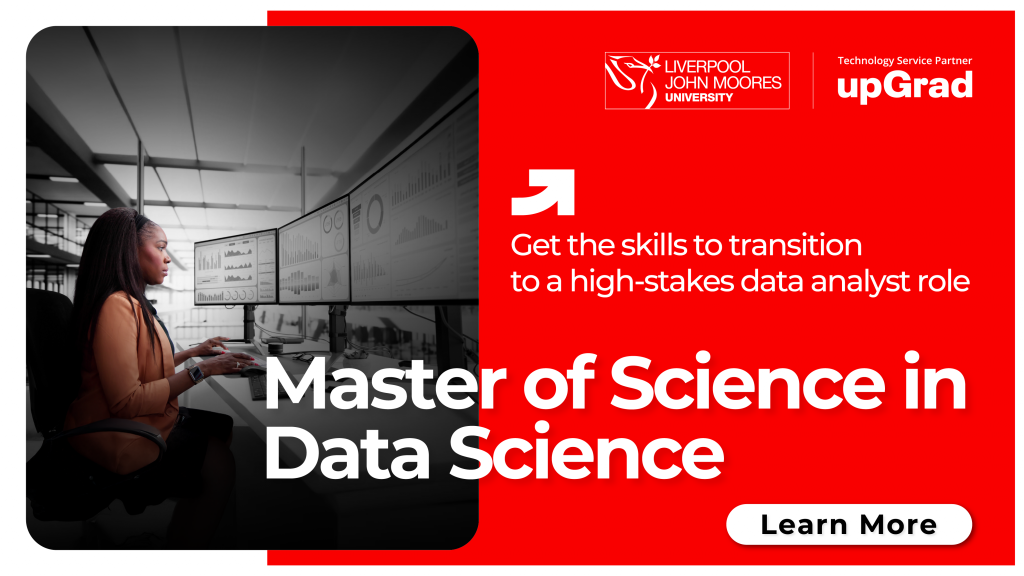The usage of generative AI in data science has completely transformed Singapore’s business sectors. The Smart Nation initiatives in Singapore have already accelerated massive digital transformation, making it an opportune time for well-equipped professionals to enter the market.
If you’re looking at pursuing a course in data science with AI, now is the best time to upskill in Singapore, seeing as 99% of transactions between the Government and citizens can now be completed digitally.
Take your skills to the next level — Explore Data Science Online Course
AI in Data Science: What Generative AI Means for Singapore’s Analytics Future
AI and data science are fast becoming intertwined in terms of the rise of generative AI throughout data science workflows.
| Sector | What Generative AI is Used For |
| Finance | Risk management, fraud detection, personalised financial advice, algorithmic trading. |
| Healthcare | Personalised medicine and treatment, medical imaging analysis, and drug discovery. |
| Smart Cities | Traffic management, urban planning, energy management, smart grid systems, energy optimisation. |
Singapore has a national program for AI research, development, and adoption in multiple sectors. The IMDA is working to develop Singapore’s digital economy while promoting the Model AI Governance Framework. SGInnovate offers support to deep tech startups as well.
| Generative AI Applications | Impact on Data Science |
| Synthetic Data Generation | Model training in healthcare without actual patient data |
| Natural Language to SQL Tools | Accessible querying for non-coders |
| AutoML and Code Assistants | Speedy model development and deployment |
| Automated Report Writing | Easier reporting load for data teams |
| LLM-Powered Insight Generation | Transformation of dashboards into more narrative-driven and interactive reports |
Generating Synthetic Data for Smarter Model Training
The fusion of data science with AI finds resonance in the release of the Proposed Guide on Synthetic Data Generation by the Personal Data Protection Commission of Singapore.
- It is a vital resource in the PET (Privacy Enhancing Technology) Sandbox.
- The guide defines PETs for the analysis, processing, and extraction of data insights without revealing sensitive information.
- The guide outlines multiple SD use cases and best practices.
AutoML and No-Code Tools for Faster Prototyping
GenAI is transforming software development with no-code tools and AutoML. It enables quicker prototyping and makes AI more accessible.
- GenAI tools generate code snippets, full prototypes, and boilerplate codes based on design specifications or natural language descriptions.
- It can generate test cases to help developers identify and tackle errors early on in the development cycle.
- No-code platforms enable drag-and-drop interfaces and visual editing while offering pre-built component libraries, templates, and machine-learning models.
- Some major tools include Google’s Vertex AI code models, GitHub Copilot, UiPath, Kovaion’s AI-driven platform, OutSystems, Appian, and Mendix.
Also Read: How Long Does It Take to Learn New AI Skills?
Natural Language Interfaces for Data Access
Natural language interfaces are enabling easier data access at multiple levels.
- Natural language data interfaces are AI-backed and enable you to interact with analytics platforms, data systems, and databases with conversational human language.
- These use advanced NLP and ML techniques to interpret user requests better and translate them into executable operations of databases.
- There’s no need to understand SQL or tackle pre-built dashboards and reporting.
- NLDIs help avoid these barriers by taking plain English queries and automatically generating suitable database commands.
Also Read: Generative AI Jobs in Singapore: High-Demand Roles You Should Know About
From Dashboards to Decision Intelligence
Generative AI in data science has ushered in massive changes from dashboards to cutting-edge decision intelligence.
- GenAI is enabling decision intelligence, fusing behavioural sciences, data science, and decision theory to offer actionable and context-rich intelligence for decisions.
- It enables intelligent workflow design while collaborating across product, UX, and data.
- It is transforming traditional BI systems and making them more dynamic, while enabling interactions through natural language and surfacing proactive insights.
Responsible AI Use in Singapore’s Regulated Sectors
AI and data science make for an excellent combination. Yet, Singapore regulators have issued several recommendations and guidelines on responsible AI usage.
- The AI Verify Foundation was launched to create a testing tool for responsible AI usage.
- The Veritas Toolkit version 2.0 regulates the use of AI responsibly in the financial sector, as created by the MAS (Monetary Authority of Singapore).
- The PDPC (Personal Data Protection Commission) consultation has underlying guidelines like clarifying how the PDPA applies to the collection and usage of personal data.
Also Read: Online Data Science Program vs Bootcamp: What’s Better for Landing a Job in Singapore?
Real-World Applications of Generative AI in Singapore’s Data Ecosystem
There are multiple real-world applications of generative AI in the data ecosystem of Singapore.
- Healthcare- Analysing medical images to help identify diseases, personalised medicine through patient data analysis, and drug discovery.
- Finance- GenAI helps identify fraudulent activities and transactions in real-time. It also creates and employs algorithmic trading strategies, while offering personalised financial advice and credit risk assessments.
- Transportation and Urban Planning- These systems optimise traffic light timings and recommend alternative routes to lower congestion.
- Real Estate- These tools can also analyse real estate data to find trends, forecast property values, and optimise urban development.
Also Read: Can You Become a Data Scientist without a Master’s Degree in Singapore?
Future-Proof Your Data Career with upGrad’s AI & Data Science Programs
upGrad offers futuristic and advanced data science and AI programs that offer hands-on training and laboratories along with globally acknowledged faculty and leading universities. You’ll find various capstone projects and 1:1 mentorship along with mentorship, career support, and favourable placement outcomes linked to these courses as well.
Here are some courses worth considering from upGrad:
- Master of Science in Machine Learning & AI from Liverpool John Moores University
- Master of Science in Data Science from Liverpool John Moores University
🎓 Explore Our Top-Rated Courses in Singapore
Take the next step in your career with industry-relevant online courses designed for working professionals in Singapore.
FAQs on Generative AI in Data Science
Q: What is the role of AI in modern data science workflows?
Ans: AI has a crucial role to play in contemporary data science workflows, including new insight generation, automation of repetitive tasks, feature engineering, data pre-processing, report writing, and model selection, among others.
Q: How is generative AI changing data analysis in Singapore?
Ans: Generative AI is efficiently transforming data analysis in Singapore by generating synthetic datasets for training machine learning models and enhancing overall insights. It also automates various tasks and generates reports.
Q: Are generative AI tools like ChatGPT used in data science?
Ans: Generative AI tools such as ChatGPT are used more these days in data science, enabling code generation and data analysis. They also help with synthetic data creation to boost overall efficiency and productivity alike.
Q: What industries in Singapore are using AI in data science?
Ans: Several industries in Singapore are leveraging AI in data science nowadays. Some of them include healthcare, finance, digital marketing and content creation, logistics, urban transportation and public services among others.
Q: Is learning generative AI tools necessary for data science jobs?
Ans: While it may not be a necessity, learning generative AI tools is crucial for data science jobs of the future. With GenAI transforming data collection, evaluation, and extraction rapidly, it is a smart move to stay abreast of these new-age tools in the current climate.





















